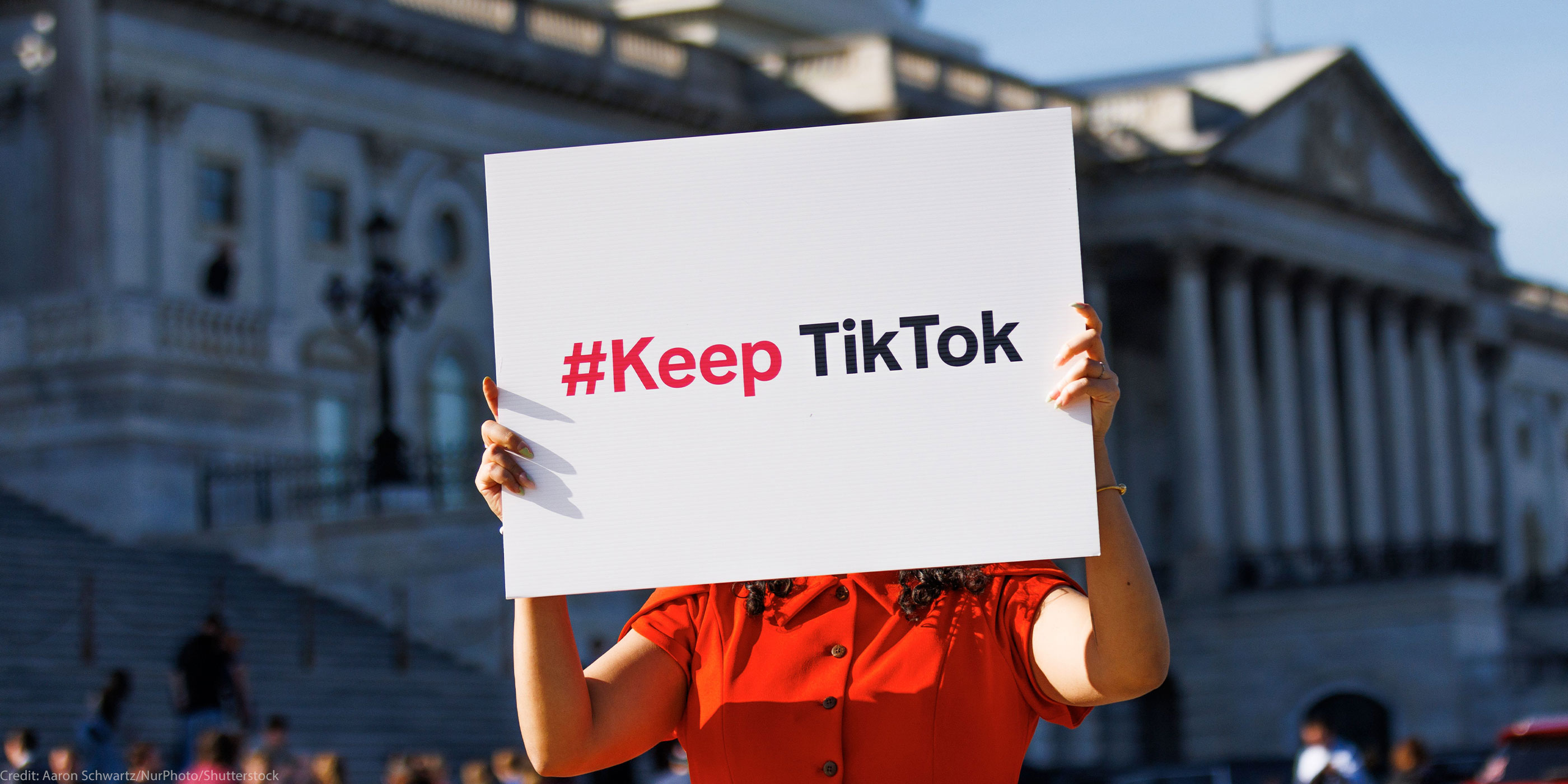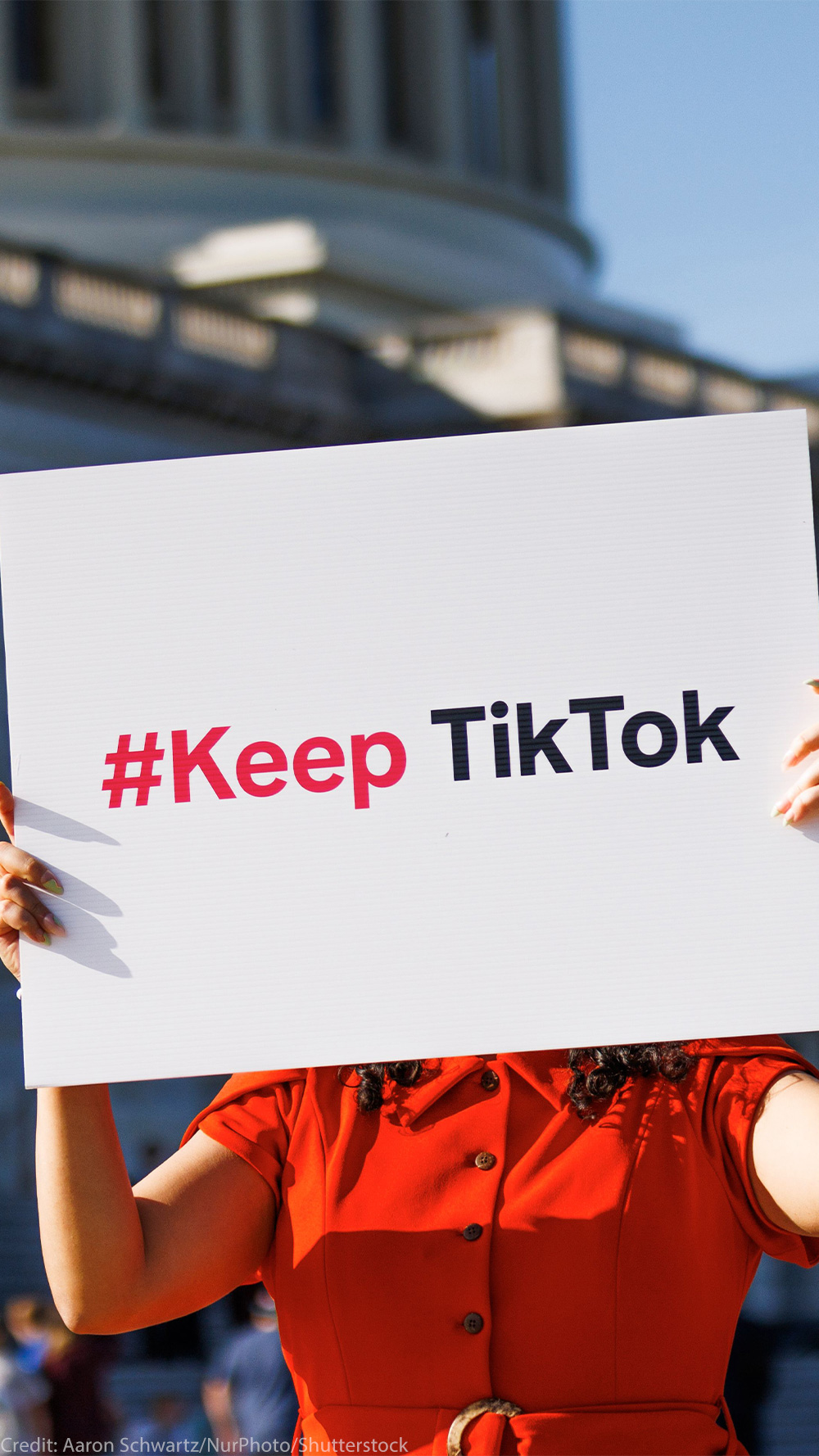Banning TikTok is Unconstitutional. The Supreme Court Must Step In.


Last week, the Supreme Court heard arguments in one of the most important First Amendment cases of our time: TikTok v. Garland. Brought by TikTok and its users, the suit challenges a law passed last Congress that will functionally ban the platform in the U.S.starting January 19. If upheld, the law won’t just impact the more than 170 million Americans who use TikTok, it will also endanger the constitutional rights of every American to speak and receive information online.
As explained in the friend-of-the-court brief the ļž–” ”∆Ķ and its partners filed with the Supreme Court, under the First Amendment the government must meet an extraordinarily high bar to ban an entire communications platform. To ban TikTok, the government must show that the ban is the only way to prevent serious, imminent harm to national security and that the ban limits no more speech than necessary to accomplish that purpose. The government has not come close to meeting that standard.
The at issue gives the president unprecedented power to shut down Americans’ speech and access to information under the guise of protecting national security. It requires TikTok’s parent company, ByteDance, to sell the app or face a ban, while also granting the president broad authority to force divestiture and ban other communications platforms with corporate parents based in China.
The Department of Justice (DOJ) the law has two purposes: to limit the Chinese government‚Äôs ability to ‚Äúcovertly‚ÄĚ manipulate what Americans see on TikTok, and to prevent the Chinese government from accessing Americans‚Äô data. But, that TikTok is being exploited in either of these ways, neither satisfies the First Amendment high bar.
The government’s first justification boils down to fear of Chinese government propaganda. Indeed, more than 20 legislators justified their support for banning TikTok in these terms; citing the risk of foreign propaganda as well as other concerns about the content carried on TikTok, such as the content available to minors and the alleged suppression of pro-Ukraine videos.
As a general rule, the government can’t simply ban speech it dislikes. When Congress restricts speech based on its content or viewpoint, and especially when it bars speech in advance, it triggers the strictest test under the First Amendment. That test requires, among other things, real evidence of serious harm. But the DOJ has acknowledged there is no evidence that China is covertly manipulating TikTok’s content in the U.S.
Regardless, courts have long held that the government cannot keep Americans from accessing foreign propaganda. In 1965, the court struck down a law that required the postmaster general to detain ‚Äúcommunist political propaganda,‚ÄĚ which could be delivered to recipients only after they specifically requested it from the U.S. post office. In its decision, the court reasoned that even this ‚Äúmere burden‚ÄĚ was an unconstitutional effort to ‚Äúcontrol the flow of ideas to the public.‚ÄĚ
Congress‚Äôs second justification for the law‚ÄĒto protect Americans‚Äô data from the Chinese government‚ÄĒalso fails under the First Amendment. While it is true that TikTok collects large amounts of user data, the government hasn‚Äôt pointed to any actual or imminent national security harm from this collection or explained how TikTok‚Äôs collection differs from that of countless other companies. But a ban would not effectively address Americans‚Äô data security anyway, because the Chinese government, or other foreign entities, can purchase Americans‚Äô personal data on the open market.
The law’s supporters have, at times, minimized the ban’s impact on the First Amendment, citing the mistaken belief that TikTok users can simply move to another platform. From a constitutional perspective, this is nonsense. The government can’t justify shutting down The Washington Post because readers can simply buy The New York Times instead. Others have likened the TikTok ban to existing restrictions on foreign ownership of radio licenses, arguing that if those rules are constitutional, so is this ban. That’s misleading. Those rules govern the allocation of a limited set of broadcast frequencies. The internet doesn’t have such constraints; it can accommodate an endless number of apps and platforms, offering Americans unlimited sources of information.
Banning TikTok is unprecedented, unconstitutional, and un-American. If the Supreme Court allows the government to shut down an entire platform on such a flimsy evidentiary record, it would set a disturbing precedent for future government restrictions on online speech. It would also increase the risk that sweeping invocations of ‚Äúnational security‚ÄĚ will trump our constitutional rights.
The government does not get to control how Americans express themselves‚ÄĒon or offline‚ÄĒbased on vague and hypothetical harms. This is the hallmark of authoritarian regimes, not the U.S.. The Supreme Court must block the ban and defend the freedoms at the heart of our democracy.



